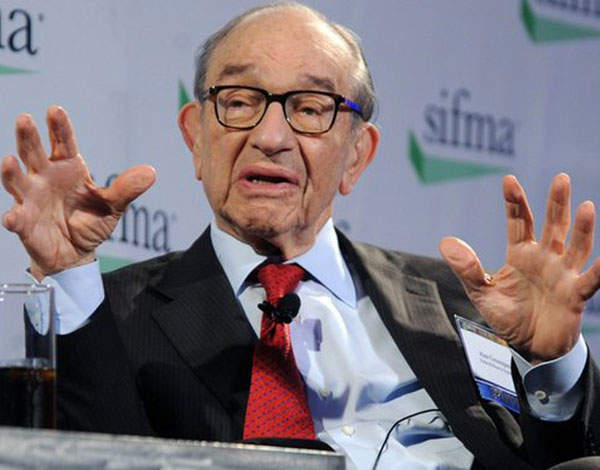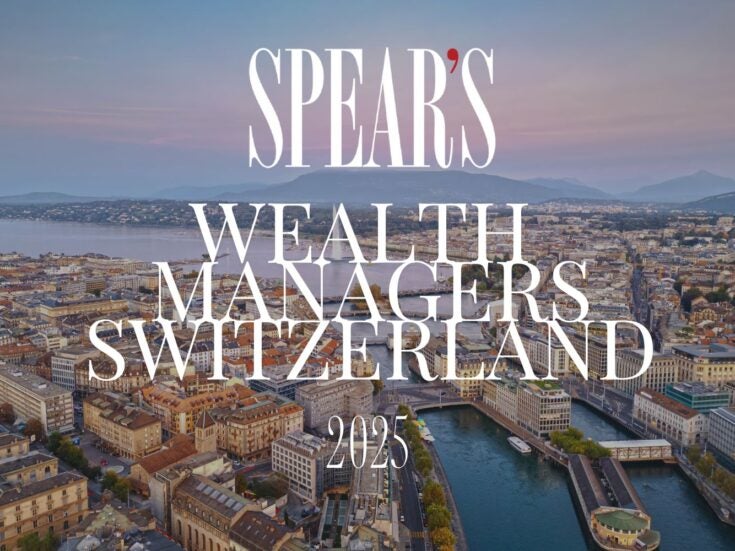
Author: by Stephen Hill

An earlier blog examined whether QE is having any effect on US and global growth and concluded that something is definitely missing from the global recovery plan, something that nobody, or no politician or central banker at least, has spotted. The second conclusion was that QE is currently doing nothing for global growth, and cannot do so as it is not connected to aggregate demand.
The reason that nobody has spotted what’s missing is simple: it’s something that doesn’t itself exist. It’s the gap, the Big Gap, between the politicians and the central bankers, which means there is no co-ordinated fiscal and monetary medium-term policy; and there hasn’t been any in the US, UK and EU since the late 1990s. Herein lay the structural seeds of Global Crunch, and the animal spirits and good old greed did the rest, leading to the crisis and the current lack of global growth.
It’s necessary to go back to a conversation around 1995 between Alan Greenspan (pictured above) and Gordon Brown MP – yes, those two arch-culprits. Greenspan was at the Fed, who let Greenspan do whatever he wanted as he didn’t do economics or ‘the vision thing’, and Brown was itching to become PM: they discussed the idea of separating the central bank from political control, and they both thought it a terrific idea, as the central bankers would have independence, and the politicians would only be able to blame them if inflation took off again. As usual, they were still dealing with yesterday’s problem of rampant inflation, while actually setting up the structure for the next crisis.
Read more on the global economy by Stephen Hill
In effect, the politicians thought they had passed the can for monetary policy over to the bankers, which they and their dumbed-down electorate could never understand anyway, while retaining the big vote-issue of fiscal policy, which the electorate understood only too well as it directly affected their pockets.
Political responsibility would be passed to regulators to make sure it all worked seamlessly. Whereas the US President and the UK PM and their central bankers used to be ultimately responsible for overall economic policy, now neither of them was: the Big Gap was born.
And the global economy soon fell into the Big Gap, as the central bankers, led by Greenspan, left interest rates far too low from 2005-2008, as they financed a property boom from Berlin to San Francisco, and from Reykjavik to Cadiz. And the politicians weren’t far behind as they spent far more than their revenue and borrowed the difference.
In 2008 the first cracks appeared as the banking industry and the public finances both fell into the Big Gap, while the regulators yawned and wondered how it had all gone quite so wrong, quite so quickly. Now, five years on, with nothing much changed structurally, and no one in gaol apart from some low-rent, high-loser traders, the printing-presses are whirring away at the Fed trying to generate an elusive recovery.
Mind the Gap
The point is this: the Big Gap must be closed, so that a medium-term global financial strategy can be formulated, covering both monetary and fiscal policies, to generate a demand-led investment recovery. The prospects for this are not good. In the US the Democrat in the White House doesn’t do economics, and is neutered by the Tea Party Republican rednecks in Congress: he wants more spending and higher taxes, but they want lower spending and no tax rises. Stalemate.
In Europe, Germany is the big winner and all the others are the losers of the Boratkini one-size-fits-all single currency: Germany wants ‘More Europe!’ meaning ‘More Germany!’, while the others are edging towards the euro-exit, waiting to see who will be the first to jump ship. Stalemate, with riots.
The UK has muddled itself along to something that looks like a recovery, but doesn’t feel like one: the smell of burning rubber from a taxpayer-financed housing recovery indicates an irresponsible pre-election boomlet, while the deficit still stands at an unsustainable £110 billion.
What hasn’t been appreciated is the changes globalisation has created, especially to risk, and to the necessity of creating, not continental market structures like NAFTA and the EU, but a truly global co-ordinated, co-operative response.
The G20 had better wake up to its new-found role, and start co-ordinating policy accordingly. And institutions like the WTO and the IMF had better wake up too. Just as the Howe-Ridley 1981 Medium Term Financial Strategy saved Thatcher’s UK from the 1970s’ stagflation, so the G20 now needs a global co-ordinated medium term strategy proposed by the IMF, with backing from Capitol Hill and the Fed, and Whitehall and the BoE, and, if they can do anything at all, Brussels and the ECB.







